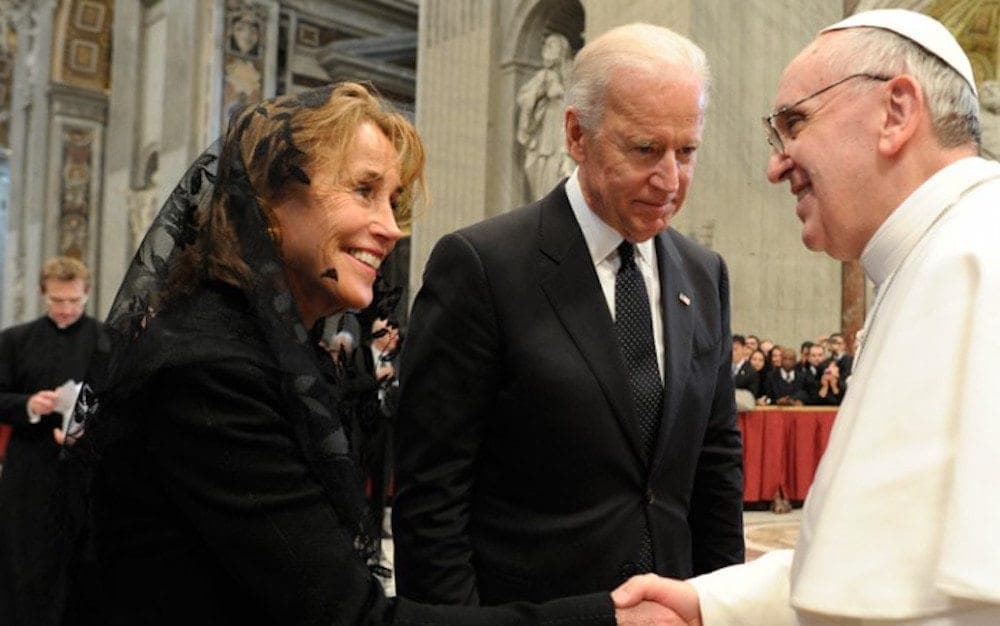May 2009 saw President Obama give Notre Dame’s commencement address. He was the most abortion rights-friendly president in history, and disagreement over his being honored tore at the fabric of US Catholicism.
The toxicity and polarization of our national politics, it seemed, had been completely absorbed by the Church.
Fast-forward to this year’s fast-approaching commencement. Notre Dame’s President, Father John Jenkins, has decided to bestow the university’s highest honor, the Laetare Medal, jointly upon Vice President Joe Biden and former Speaker of the House John Boehner.
Jenkins insisted Notre Dame “is not endorsing the policy positions of either,” but instead “celebrating two lives dedicated to keeping our democratic institutions working for the common good.”
But because of Biden’s positions on abortion, Notre Dame’s “Faculty for Life” group unanimously passed a resolution condemning Jenkins, even claiming “Notre Dame has chosen to honor power at the expense of truth.” Students wrote a letter to the editor insisting that Notre Dame has “failed to live up to its Catholic mission.”
Almost all traditionally pro-life and conservative websites which covered the story did so with a disdain reminiscent of the Obama invitation. The local bishop of South Bend/Fort Wayne, Kevin Rhoades, wrote a strongly-worded letter condemning the invitation because “direct abortion is gravely contrary to the natural law and violates a very fundamental principle of Catholic moral and social teaching.”
Rhoades does not think it’s “intellectually coherent” to give such an award without giving implicit support to Biden’s policies. Doing so could “give the impression….that one can be ‘a good Catholic’ while also supporting or advocating positions that contradict our fundamental moral and social principles and teachings.”
But is this really the case? Notre Dame gave this same award to President John F. Kennedy. In light of the Bay of Pigs Invasion, did Notre Dame necessarily cause scandal with regard to the Church’s teaching that war must always be defensive? Maybe. It is at least intellectually coherent to argue that it did not.
But let’s posit that Rhoades is correct. How did Boehner escape criticism? On everything from torture, to a living wage, to immigration, the former Speaker’s positions are at odds with Catholic teaching. Indeed, welcoming the stranger, a preferential option for the poor, and the dignity of the person are non-negotiable Catholic principles.
One might claim Boehner accepts these principles, but has a prudential disagreement with the U.S. bishops (not to mention with the past several popes) about how to reflect them in policy. Mustn’t the good of a high minimum wage be balanced against the number of jobs lost to automation? Can’t Catholics disagree about whether waterboarding is torture? Must Catholics who welcome the stranger accept open borders?
Far too often Catholics move from moral principle to policy as if there are no prudential judgments to make, and this is no less true of abortion policy.
Biden believes that human life begins at conception and that abortion is “always wrong.” But when it comes to reflecting those moral principles in U.S. policy, Biden has a prudential disagreement with most pro-lifers, including me. He errs on the side of discouraging abortion and providing the legal space to protect the consciences of those who think differently.
Many other pro-choice Catholics also accept the Church’s moral principles, but believe a legal ban would create a black market for the same number of abortions, risking the lives of women in the process.
I can see why Rhoades and others would argue that someone with such a view does not deserve the Laetare Medal. The issues at stake involve fundamental justice for the most vulnerable, and so even a mistaken prudential judgement about how best to reflect a fundamental moral principle in public policy might be a deal-breaker.
But if it is a deal-breaker for Biden, it is a deal-breaker for Boehner as well. He is just as mistaken in his prudential judgments about how best to reflect fundamental moral principles into public policy.
Indeed, the fact that most Catholic pro-lifers focused exclusively on Biden continues to send a devastating message about our movement: that we are aligned with the values and goals of the GOP. This fundamentally undermines our ability to reach outside of conservative circles.
In the 1970s, Biden was a critic of Roe v. Wade. What might have happened if, instead of going all-in with the GOP, the pro-life movement had embraced the consistent ethic of Cardinal Joseph Bernardin, St. John Paul II, Pope Benedict XVI, and Pope Francis?
How many millions, who have become pro-choice, would have instead embraced the pro-life movement as a trans-partisan attempt to realize basic justice for the most vulnerable?
Happily, many new pro-life groups are explicitly rejecting the old abortion politics. Indeed, given the views of young people on abortion, it is only a matter of time before the broader culture comes to realize that abortion is not a left/right issue.
The reaction of most pro-life groups to Biden’s being honored at Notre Dame, however, indicates that old political habits die hard.















